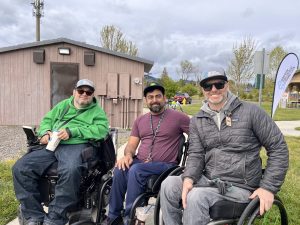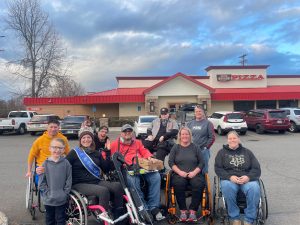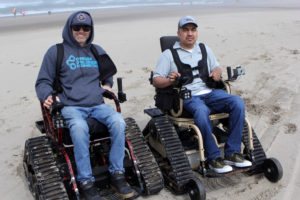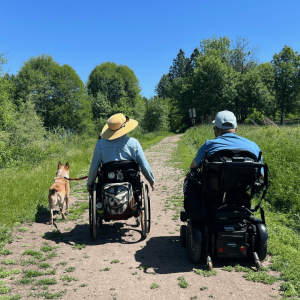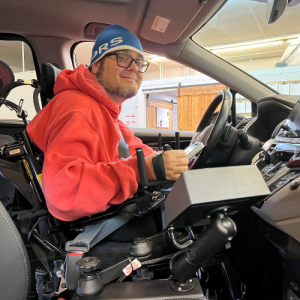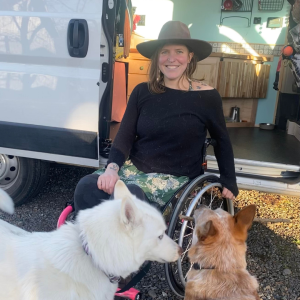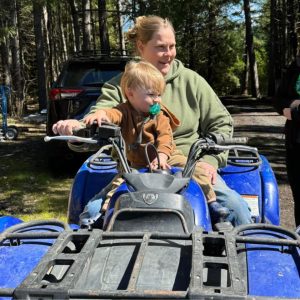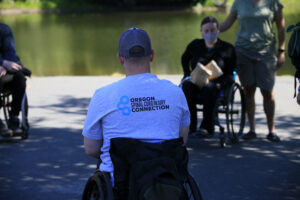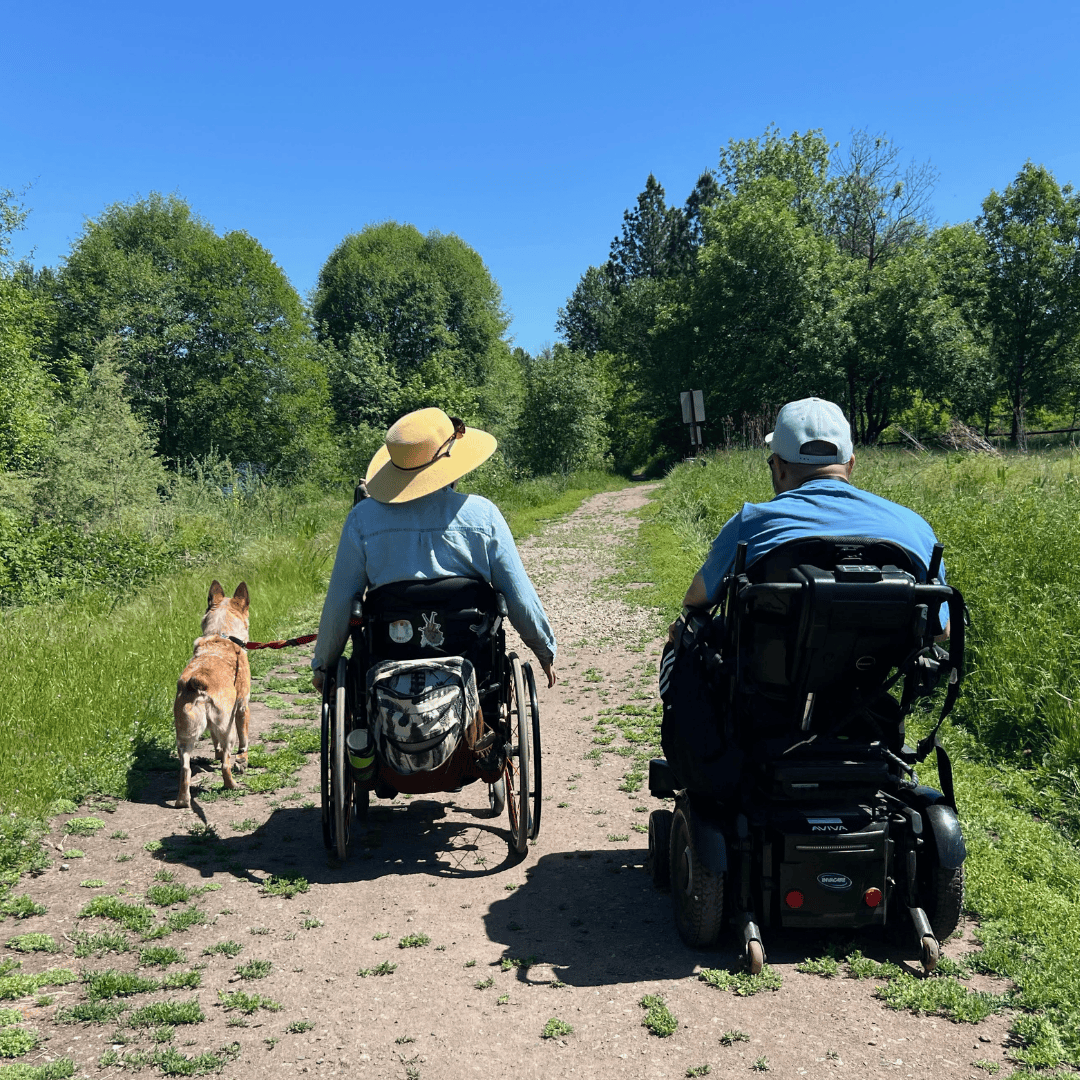
Community Health Workers: Support & Guidance after SCI
Community Health Workers: Support & Guidance after SCI
If you or someone you love has a spinal cord injury (SCI), you already know that navigating daily life—let alone the healthcare system—can be overwhelming. From figuring out rehab options to battling insurance red tape, just getting the right care and support can feel like a full-time job. And that’s before you factor in the emotional toll of adjusting to life after an injury.
That’s where Community Health Workers (CHWs) come in. They aren’t just healthcare workers; they’re advocates, problem-solvers, and trusted guides who help people get the resources and care they need. At Oregon Spinal Cord Injury Connection (OSCI), CHWs are making a real difference by supporting people with spinal cord injuries in ways that go far beyond the typical healthcare experience.
So, what does that look like in practice? Let’s break it down.
What CHWs Do for the SCI Community
CHWs at OSCI meet people where they are—physically, emotionally, and logistically. They bridge the gap between medical providers and real life, making sure people with spinal cord injury understand the journey ahead of them and how to access the tools they need to thrive. Here’s how:
Helping Navigate the Healthcare System
After an SCI, there’s a steep learning curve. From understanding insurance coverage, finding the right specialists, asking the right questions, CHWs guide people through the system step by step. Need help getting a referral? Confused by your discharge plan? A CHW can help translate all that medical jargon into real-world steps. Understanding your own complex medical needs after spinal cord injury is like learning a new language. A Community Health Worker from OSCI is your guide. They know the journey because they have lived it.
Connecting People to Essential Services
Adjusting to life with a spinal cord injury often means needing new types of support—adaptive equipment, home modifications, personal care assistance, transportation, and more. CHWs don’t just point people in the right direction; they help them actually access these resources.
If someone needs a wheelchair repair but doesn’t know where to go, a CHW can connect them with our free Wheelchair Maintenance Workshops or a trusted local provider. If transportation is an issue, they’ll help find accessible options. It’s all about removing barriers so people can live more independently.
Offering Emotional and Peer Support
A spinal cord injury isn’t just a physical challenge—it’s an emotional one, too. Spinal cord injury recovery is an emotional rollercoaster. Feelings of isolation, frustration, and grief are extremely common, especially in the early stages. CHWs provide a listening ear and a connection to others who deeply understand the struggle.
Community Health Workers also help people plug into community events and social groups so they don’t have to go through it alone. Whether it’s a casual meet-up, a structured support group, or just a conversation with someone who gets it, these connections can be life-changing.
Advocating for Accessible Housing and Independent Living
One of the biggest challenges people with SCI face is finding accessible, affordable housing. CHWs at OSCI work with individuals to identify living situations that meet their needs, whether that’s modifying a current home, applying for disability-friendly housing programs, or working with landlords on accommodations.
They also connect people with in-home support services, helping them navigate programs that provide caregivers, personal assistants, or other forms of daily living assistance.
Empowering People with Knowledge
Medical professionals often focus on treating an SCI, but living with one involves so much more than that. CHWs provide education on everything from managing secondary health issues (like pressure sores or UTIs) to staying active and engaged in the community.
By equipping people with the right information, CHWs help them take charge of their health and well-being, rather than just reacting to problems when they arise.
Promoting Recreation and Adaptive Sports
Life after an SCI doesn’t have to mean giving up the things you love. OSCI and its CHWs help connect people with adaptive sports programs, outdoor activities, and community events that keep them engaged and moving. Whether it’s handcycling, adaptive mountain biking, or simply finding accessible trails, CHWs encourage people to rediscover adventure in new ways.
Supporting Employment and Financial Stability
A spinal cord injury can throw someone’s career plans off track, but that doesn’t mean their professional life is over. CHWs help individuals with SCI explore job training programs, workplace accommodations, and financial assistance options to regain financial independence.
They also help with applying for disability benefits, vocational rehab programs, and other financial resources that can make life more stable.
Why This Work Matters
Without CHWs, too many people with SCI fall through the cracks. They might get discharged from the hospital without knowing where to turn. They might struggle for months (or years) trying to access basic services that should be easy to find. They might feel isolated, frustrated, or like they’re constantly having to fight just to get their needs met.
But with CHW support, things start to shift. People get the right resources at the right time. They find community instead of feeling alone. They learn how to advocate for themselves and build a life that works for them.
At the end of the day, CHWs aren’t just helping people survive after a spinal cord injury—they’re helping them live fully.
You can help too!
If this work speaks to you, there are a few ways you can help:
Spread the word – Many people with SCI don’t even know CHWs exist! If you know someone who could benefit, let them know about OSCI’s programs.
Advocate – CHWs are doing life-changing work, but the system wasn’t built to support people with physical disabilities. Supporting policies that invest in community health can make a big difference.
Get involved – Whether it’s volunteering, donating, or simply showing up to community events, supporting organizations like OSCI helps expand these critical services.
Final Thoughts
For people living with spinal cord injuries, navigating life can feel like climbing a hill in the dark. But Community Health Workers can help shine a light on the journey and guide you up the hill. No one has to do it alone. At Oregon Spinal Cord Injury Connection, CHWs are out there every day making sure folks have access to care, community, and opportunities that allow them to live life on their own terms.
They’re more than just healthcare workers—they’re connectors, advocates, and allies who help make Oregon a better, more inclusive place for everyone.
So, whether you’re someone with an SCI, a caregiver, or just someone who cares about health equity, take a moment to appreciate the work CHWs do. And if you ever get the chance to support them—or even become one—go for it. Your community will be stronger because of it.


